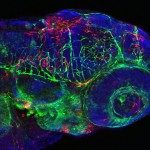Lien vers Pubmed [PMID] – 24865811
Trends Microbiol. 2014 Sep;22(9):490-7
Host-pathogen interactions can be very complex at all scales; understanding organ- or organism-level events require in vivo approaches. Besides traditional host models such as mice, the zebrafish offers an attractive cocktail of optical accessibility and genetic tractability, blended with a vertebrate-type immunity, where innate responses can easily be separated from adaptive ones. Applied to viral infections, this model has revealed unexpected idiosyncrasies among organs, which we believe may apply to the human situation. We also argue that the dynamic analysis of virus spread and immune response in zebrafish make this model particularly well suited to the exploration of the concept of infection tolerance and resistance in relation to viral diseases.

